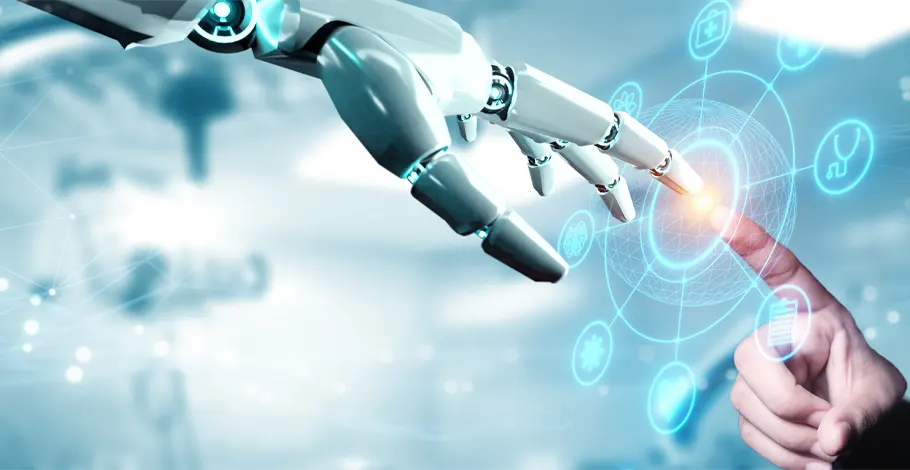In This Article
Overview
Leveraging technology and everything at our disposal is imperative when tackling heart disease and cancer. Before the battle even begins, the first step is finding what the patient’s fighting. And discovering the risk of developing heart disease or cancer or identifying it at an early phase can significantly affect the outcome or the patient’s lifespan.

According to the American Cancer Society, it’s estimated that there were about 1.9 million new cancer cases in the United States in 2022.[1] On a worldwide level, heart disease is the leading cause of death, responsible for approximately 16% of all fatalities. [2]
AI’s proven to help diagnose these conditions and assist healthcare professionals during the diagnosis process. Read on to learn how AI’s advancement reshaped healthcare in the departments of detecting cancers and heart disease.
How Ai’s Advancement Reshaped Healthcare?
AI Can Boost the Detection Rate of Breast Cancer by 20%
According to the study by Lancet Oncology, leveraging AI’s healthcare potential in reading mammography results can improve breast cancer detection by 20%.[3]
The idea was to offer an AI-based analysis of screenings to be supported by a single radiologist. Another group consisted of two radiologists who looked at screenings without the help of artificial intelligence. The findings noted that the AI analysis supported by a single human radiologist detected 20% more cancers.
Clarification is necessary here because experts note two reasons exist for the improved detection rate. The first is AI’s capability to see things the naked eye can’t. Regardless of the healthcare professional’s knowledge or experience, AI’s capable of analyzing mammograms more closely.
On the other hand, the study also showed that artificial intelligence could “over-detect” lesions that are actually harmless. AI might also display wrong results due to unknown operating errors, so there’s a long way to go before perfecting this approach. It’s worth noting that there was a 1.5% false positive rate, and that’s no higher than the rate indicated in the group of patients whose screenings were analyzed solely by radiologists.
Using AI’s Capabilities To Save Time for Healthcare Screenings
The healthcare industry’s mammogram workload is considerable, using MRIs and other imaging methods. Depending on the location, the waiting list can be so long that some patients don’t get a screening for months. That’s because a single examination, in addition to image reconstruction and analyzing results, takes time and effort. Here’s where AI’s main healthcare advantage lies: It has a huge potential to reduce wait times for cancer patients.
The same breast cancer study notes that AI decreased the screen reading workload by 44.3%. That lowers the burden on radiologists, ensuring they can examine more patients while keeping optimal image quality and minimizing the risk of potential mistakes made due to a rushed workload.
Cameras powered by AI technology could detect anatomical points in patients to ensure they’re in the correct position for the best possible image quality. That saves time per examination, which is important for the healthcare professional and the patient. Anxious patients or those afraid of MRI and other scans will appreciate shorter scan times, improving the radiology department’s productivity.
The AI Tool That Can Predict Lung Cancer
If a person is at a lung cancer risk for different reasons, the recommendation is to get an annual low-dose CT scan. But the radiologist can see only as much as the naked eye allows, so even regular screenings don’t always help. If AI’s capability to scan the results to the smallest detail can be leveraged, that could improve cancer discovery in an early phase.
According to a study published in the Journal of Clinical Oncology, an AI tool called Sybil can predict that an individual will develop lung cancer in the next 12 months with an accuracy rate between 86% and 94%. Scientists from the Massachusetts Institute of Technology and the Mass General Cancer Center developed this AI-powered platform, and testing has delivered positive feedback.
Sybil is only currently available in clinical studies, awaiting Food and Drug Administration approval. If the tool gets certified to be used widely in the healthcare industry, it could completely reshape early lung cancer detection.
AI’s Healthcare Potential Can Assist in Diagnosing Cardiovascular Disease
The World Health Organization believes that 80% of premature cardiovascular disease cases are preventable. It’s imperative to determine precise treatment and understand cardiovascular disease in a timely manner. Thanks to AI’s improvement, healthcare experts can better determine treatments from the early stage, which improves the quality of life and decreases the mortality risk.
Artificial intelligence is capable of analyzing genes within the DNA, with the goal of acquiring data that could help consider the future risk of heart failure, atrial fibrillation, and other cardiovascular diseases. A Rutgers study pinpoints that applying AI and machine learning techniques can provide insights and actionable intel that provides improved customized treatments and helps identify cardiovascular disease risk at an early stage.[4]
The machine focuses on identifying genetic biomarkers associated with the manifestation of heart failure and other ailments. The application discovered that race and age could be more associated with atrial fibrillation, while gender and age are the more prominent criteria for heart failure. AI might be capable of recommending healthcare treatments for each patient based on the analysis of their genetic biomarkers.
Can AI Establish the Risk Factor for Stroke?
Based on the results of electrocardiograms, a screening strategy based on artificial intelligence is capable of identifying atrial fibrillation, an abnormal heart rhythm considered a risk factor for blood clots that lead to a stroke. According to the Mayo Clinic, this approach has potential, but it’s a long way from widespread implementation.[5]
The reason is that applying the model is too expensive, while the current results it delivers aren’t in line with the cost.
However, there’s no denying that screening supported by AI’s healthcare capabilities improved atrial fibrillation detection. Artificial intelligence can identify irregular heartbeats even if the rhythms shown on the standard ECG seem normal. The algorithm is also capable of prioritizing patients for intensive monitoring, which could lead to decreasing the rates of undiagnosed irregular heartbeat.
AI can be capable of picking up on cardiac amyloidosis and hypertrophic cardiomyopathy by identifying the heart chamber size and heart wall thickness. The larger the database to train the algorithm, the more reliable results could be.
AI Can Be an Expert’s Best Friend
Artificial intelligence isn’t intended to replace doctors or other healthcare professionals. Many studies related to using AI and healthcare determined that these two factors combined are the way to achieve the best result and maximize the quality of care. For example, AI’s healthcare assistance in ultrasound involves assuming some repetitive tasks such as setting automatic measurements that the experts can adjust. That speeds up the entire process but also ensures nothing can be done without being confirmed by a human with the required expertise.
The way artificial intelligence is changing diagnosing cancers and heart disease is by analyzing large amounts of data and looking at the scan results and other relevant information from a different perspective. AI can catch some details in the images that might be invisible to the naked eye and even recommend healthcare treatments based on comparing the patient’s data to the existing information in the database.
5 Sources
We review published medical research in respected scientific journals to arrive at our conclusions about a product or health topic. This ensures the highest standard of scientific accuracy.
[2] The top 10 causes of death : https://www.who.int/news-room/fact-sheets/detail/the-top-10-causes-of-death#:~:text=The%20world's%20biggest%20killer%20is,8.9%20million%20deaths%20in%202019
[3] Study by Lancet Oncology : https://www.thelancet.com/journals/lanonc/article/PIIS1470-2045(23)00298-X/fulltext
[4] Investigating genes associated with heart failure, atrial fibrillation, and other cardiovascular diseases, and predicting disease using machine learning techniques for translational research and precision medicine : https://www.sciencedirect.com/science/article/pii/S0888754323000289#bb0010
[5] Mayo Clinic Study Shows AI Can Help Detect Atrial Fibrillation : https://healthitanalytics.com/news/mayo-clinic-study-shows-ai-can-help-detect-atrial-fibrillation








 This article changed my life!
This article changed my life! This article was informative.
This article was informative. I have a medical question.
I have a medical question.
 This article contains incorrect information.
This article contains incorrect information. This article doesn’t have the information I’m looking for.
This article doesn’t have the information I’m looking for.